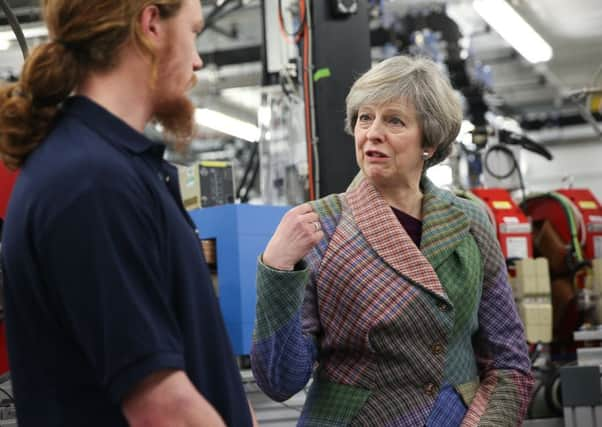Brexit: Theresa May pledges to spread wealth around country


The Prime Minister unveiled an industrial strategy that includes investment in high-growth sectors of the economy and investment in technical education to improve skill levels.
However, the Scottish Government said UK ministers had failed to engage fully on areas where the strategy deals with devolved responsibilities and the Prime Minister was accused of reheating already-announced funding pledges.
Advertisement
Hide AdAdvertisement
Hide AdLaunching the strategy at her first Cabinet meeting outside London, Mrs May said her government would “step up” to deliver major improvements in infrastructure and broadband needed to encourage private investment.
The Cabinet met at a science park near Warrington in north-west England to reveal plans for a £556 million boost for the so-called “northern powerhouse”, £170m cash for technical education, and a new emphasis on science, technology, engineering and innovation.
Mrs May said: “This is a very important part of our plan for Britain. This is how we shape a stronger future for the UK and also ensure we are building a fairer Britain and a better Britain.
“One of the themes that underpins what we are doing in the industrial strategy and underpins our plan for Britain, is ensuring we drive growth across the whole of the UK, that we ensure that we are building on the strengths of different parts of our economy and different parts of the UK, and that we see prosperity and opportunity spread across the country so everybody has those opportunities to get on in life.
“And you’ll see through the industrial strategy, the pillars that are in here, the importance of issues like infrastructure, skills, ensuring young people have the skills they need for the future, working, looking at the way in which clusters can help to drive economic growth.”
She added: “This is important anyway, but as we leave the European Union we want to ensure that we are that truly global Britain with an economy that is in the right shape for the future and driving that growth, so that we really do have an economy in the country that works for everyone.”
The document outlines ten key areas for action, including the development of skills, upgrading infrastructure and delivering affordable energy.
It highlights the difference between productivity output levels in the UK and other large economies, and between different areas of the country.
Advertisement
Hide AdAdvertisement
Hide AdScottish businesses and workers have been encouraged to help shape the strategy through a 12-week consultation on the proposals.
On a visit to Tennent’s Brewery and its training academy in Glasgow, UK energy minister Jesse Norman said the strategy would build on Scotland’s economic strengths, “creating more opportunities, prosperity and jobs”.
Scottish economy secretary Keith Brown said: “The UK has been lacking a strategic approach to industrial policy for many years and has suffered as a result.
“The need to address that gap is now even more urgent given the huge threat posed by the UK government’s proposed hard Brexit, outside of the world’s biggest single market which jeopardises key areas such as university research and attracting talent, which are so vital to our economic future.
“We remain ready to work with UK colleagues to build on our experience for the wider benefit of the UK as a whole. However, there has been a disappointing lack of engagement during the development of this paper.”
Labour former Cabinet minister Lord Hutton, chairman of the Nuclear Industry Association, said the move marked a major shift in government outlook.
He told a radio network: “I think, if you look at the last 30 or 40 years, it is, actually, quite a big shift in the thinking of a Conservative government, and is something I really strongly welcome. I think it’s a very significant shift.”
But Shadow business secretary Clive Lewis said the announcement was “full of rhetoric and thin on detail”. “From business rates to Brexit, many of businesses’ most pressing concerns are currently going unanswered,” said Mr Lewis.